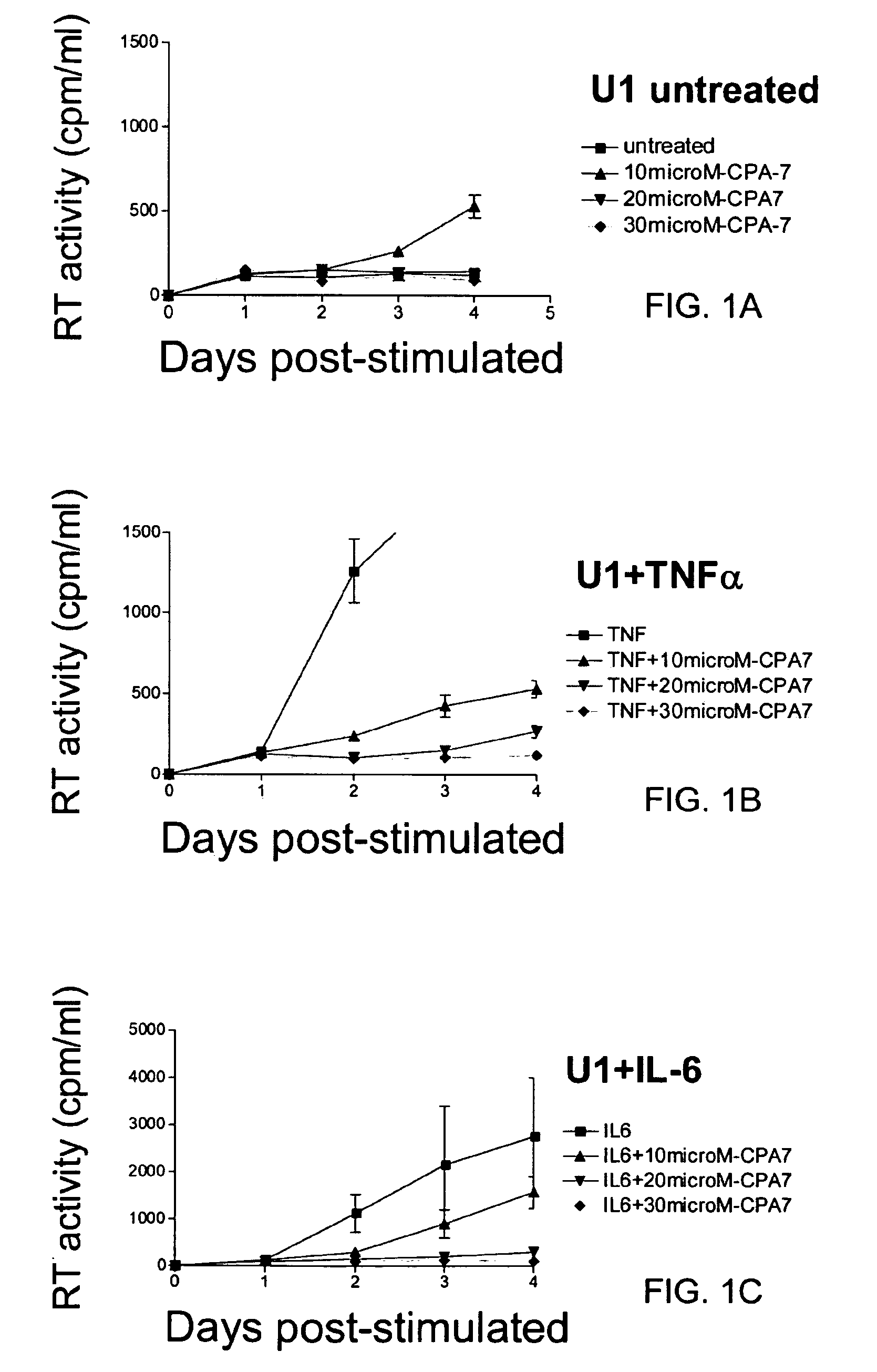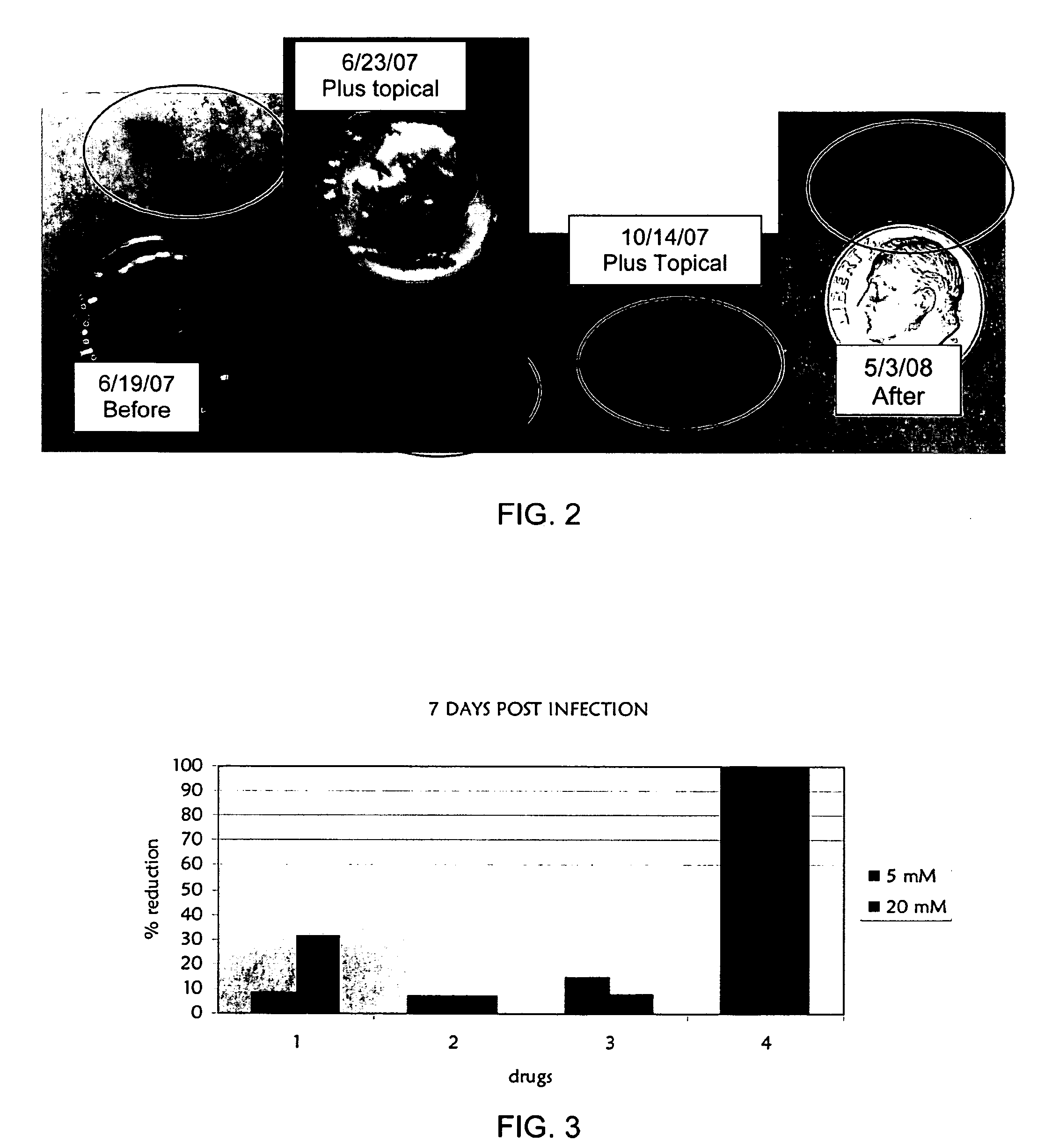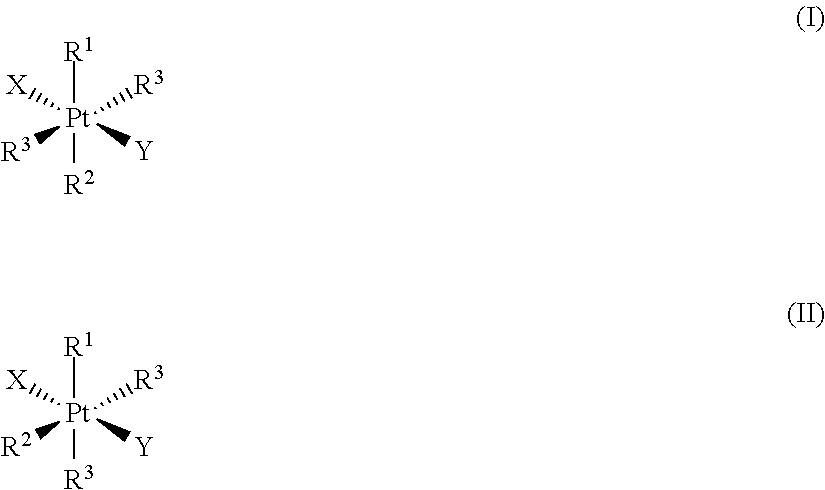Lipid raft, caveolin protein, and caveolar function modulation compounds and associated synthetic and therapeutic methods
a function modulation and lipid raft technology, applied in biocide, platinum organic compounds, drug compositions, etc., can solve the problems of virus deficient in functional nef failure to establish high viral loads or progress into disease, myelosuppression (leukopenia and thrombocytopenia) and inherent and acquired resistances are more prohibitive, and virus deficient in functional nef cannot achieve high viral loads or disease progression
- Summary
- Abstract
- Description
- Claims
- Application Information
AI Technical Summary
Problems solved by technology
Method used
Image
Examples
example 1
In Vitro Inhibition of HIV Replication
[0056]The U1 cell line was derived from U937 promonocytic cells surviving the cytopathic effect associated with the acute infection by HIV-1LAI / IIIB. U1 cells contain two integrated copies of proviral HIV DNA and are characterized by low constitutive levels of virus expression that can be upregulated by several cytokines and phorbol esters. U1 cells were cultivated at 2×105 cells per ml in RPMI medium 1640 (M.A. Whittaker Bioproducts, Walkersville, Md.) supplemented with 1 mM HEPES buffer, antibiotics and glutamine plus 10% fetal calf serum (FCS) (Hyclone Laboratories, Logan, Utah), containing less than 7 pg / ml of endotoxin. The cells were cultured in 96 or 48 well flat-bottomed plastic plates (Costar, Cambridge, Mass.) and incubated with the different stimuli at 37° C. in 5% CO2. TNF-alpha (1 ng / mL) (FIG. 1B), or IL-6 (10 ng / mL) (R&D Systems) (FIG. 1C) were added as stimulants for 20 min at 37° C. In addition to the presence or absence of stimu...
example 2
Topical Application and Inhibition of Tumor Transformation
[0057]FIG. 2 illustrates a skin mole, initially presenting as asymmetric, bumpy and with multiple colors. A solution of 1.0×10−3 M CPA-7 was applied topically to the mole with a Q-tip on three occasions (Jun. 19, 2007; Jun. 23, 2007, and Oct. 14, 2007). The mole became darker (6 / 23) and scabbed, with the scab peeling off spontaneously. Notice the three freckles to the right identify the same mole. Almost one year later (May 3, 2008), the mole continues to look healthy. While the mole itself became scabbed, there was no itching, burning, or discomfort of any kind.
example 3
Sucrose Gradient Separation and Identification of Platinum in Caveolar Fractions
[0058]A549 Human lung adenocarcinoma cells were maintained in a 1:1 mixture of Dubelco's Modified Eagle Medium-high glucose (DMEM-Gibco) and F-12 nutrient mixture (Gibco) supplemented with 10% fetal bovine serum (FBS) (Biowhittaker) and 100 u / mL penicillin-streptomycin (Biowhittaker). Cells were maintained in culture flasks incubated at 37° C. and 5% CO2. These were exposed to 20 μM CPA-7 for 8 h. To harvest, cells were loosened with trypsin-versene, collected and centrifuged. After 3 washes with media, cells were frozen with 10% DMSO until analyzed.
[0059]Caveolae were isolated essentially as follows: Cells were homogenized in 2 ml MBS buffer (25 mM morpholinoethane sulfonic acid, pH 6.5, 0.15M NaCl, 1% Triton X-100, and 1 mM PMSF) using a motor-driven Teflon glass Thomas homogenizer, which has a serrated pestle. Two ml of 80% sucrose in MBS without Triton X-100 was then added and the homogenate was plac...
PUM
| Property | Measurement | Unit |
|---|---|---|
| pH | aaaaa | aaaaa |
| pH | aaaaa | aaaaa |
| width | aaaaa | aaaaa |
Abstract
Description
Claims
Application Information
 Login to View More
Login to View More - Generate Ideas
- Intellectual Property
- Life Sciences
- Materials
- Tech Scout
- Unparalleled Data Quality
- Higher Quality Content
- 60% Fewer Hallucinations
Browse by: Latest US Patents, China's latest patents, Technical Efficacy Thesaurus, Application Domain, Technology Topic, Popular Technical Reports.
© 2025 PatSnap. All rights reserved.Legal|Privacy policy|Modern Slavery Act Transparency Statement|Sitemap|About US| Contact US: help@patsnap.com



